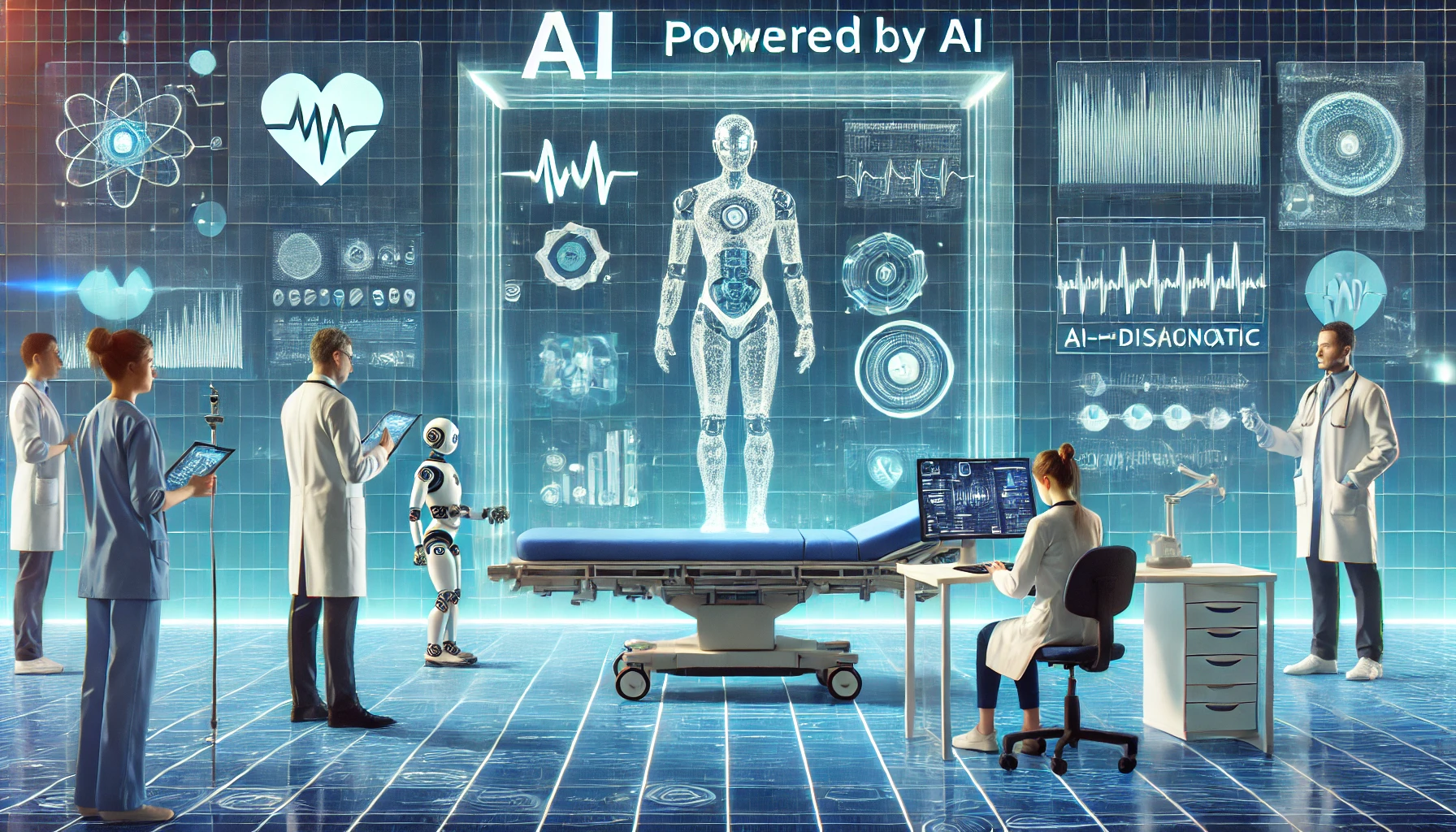Artificial Intelligence (AI) is transforming healthcare by enhancing disease detection, optimizing treatment plans, and streamlining hospital operations. AI-powered tools help doctors analyze medical images, predict health risks, and provide personalized treatments. This article explores the deep impact of AI on modern medicine and the future of healthcare innovation.

Image: Healthcare professional working with AI-powered medical technology. Photo by Thirdman from Pexels, licensed under Pexels License.
1. The Role of AI in Modern Healthcare: How AI is Reshaping Medicine
AI is playing a critical role in healthcare by:
Improving diagnostics with AI-powered imaging and data analysis.
Enhancing patient care through AI-driven virtual assistants.
Optimizing hospital management by automating administrative tasks.
By leveraging machine learning, AI can process vast amounts of medical data, identify patterns, and assist healthcare professionals in making faster and more accurate diagnoses. AI-powered systems also reduce human error and improve efficiency in hospitals and clinics.
Key Impact: According to the 2024 Healthcare AI Adoption Report, hospitals implementing AI diagnostic tools have seen a 42% improvement in early disease detection rates and a 35% reduction in diagnostic errors.
2. AI in Medical Diagnostics: How AI is Improving Disease Detection
A. AI-Powered Medical Imaging and Radiology
AI algorithms analyze X-rays, MRIs, and CT scans with remarkable accuracy. Google DeepMind Health and IBM Watson Imaging AI assist radiologists in detecting abnormalities such as cancerous tumors, fractures, and neurological disorders. AI can identify diseases in their early stages, significantly improving treatment outcomes.

Image: Medical professional analyzing diagnostic images with AI assistance. Photo by Klaus Nielsen from Pexels, licensed under Pexels License.
B. AI for Predictive Diagnostics and Early Disease Detection
AI-driven predictive analytics assess a patient’s risk of developing diseases by analyzing genetic data, lifestyle habits, and medical history. Tools like Tempus AI and Qure.ai help doctors predict and prevent diseases such as diabetes, cardiovascular conditions, and Alzheimer’s before symptoms appear.
C. AI-Powered Pathology and Lab Analysis
AI is accelerating laboratory research by automating the detection of infectious diseases and genetic disorders. PathAI and BioMind AI analyze blood samples, biopsy images, and genetic sequences with high accuracy, assisting pathologists in diagnosing diseases faster.
“AI isn’t replacing doctors—it’s giving them superpowers. The combination of human clinical experience with AI’s pattern recognition capabilities is creating a new paradigm in medical diagnostics.” — Dr. Eric Topol, Cardiologist and Digital Medicine Researcher
3. AI in Personalized Medicine: How AI is Tailoring Treatments to Individuals
A. AI-Driven Drug Discovery and Development
AI accelerates drug discovery by predicting how molecules interact with diseases. Atomwise AI and Insilico Medicine use AI-powered simulations to design new drugs faster, reducing the time and cost of pharmaceutical development.
B. AI in Precision Medicine and Genetic Treatments
AI-driven precision medicine tailors treatments based on a patient’s genetic makeup. IBM Watson for Oncology provides personalized cancer treatment recommendations by analyzing genetic data, ensuring that patients receive the most effective therapies.

Image: Laboratory researcher working on personalized medicine solutions. Photo by Artem Podrez from Pexels, licensed under Pexels License.
C. AI-Enhanced Mental Health Support and Therapy
AI-powered chatbots like Woebot and Wysa provide mental health support through cognitive behavioral therapy (CBT) techniques. AI-driven platforms also analyze speech and text patterns to detect signs of depression, anxiety, and PTSD, enabling early intervention.
Case Study: A 2024 clinical trial found that patients using AI-powered therapy applications alongside traditional treatment showed a 27% greater improvement in depression symptoms compared to those receiving only traditional therapy.
4. AI in Hospital and Patient Management: How AI is Optimizing Healthcare Operations
A. AI in Robotic Surgery and Assisted Procedures
AI-powered robotic surgical systems, such as Da Vinci Surgical System, enhance precision in complex procedures, minimizing risks and improving recovery times. AI also assists in minimally invasive surgeries, reducing complications and hospital stays.
B. AI-Driven Virtual Health Assistants and Telemedicine
AI chatbots and virtual assistants, such as Babylon Health AI and Ada Health, provide medical advice, schedule appointments, and monitor patient health remotely. AI-driven telemedicine platforms expand access to healthcare, especially in rural and underserved areas.

Image: Patient engaged in telemedicine consultation enhanced by AI technology. Photo by Tima Miroshnichenko from Pexels, licensed under Pexels License.
C. AI in Hospital Workflow Optimization
Hospitals use AI-powered tools like Qventus AI and Olive AI to streamline patient scheduling, reduce wait times, and improve resource allocation. AI-enhanced electronic health records (EHRs) assist doctors in accessing patient histories quickly and accurately.
5. The Future of AI in Healthcare: What’s Next for AI in Medicine?
The healthcare industry is on the threshold of even more transformative AI innovations:
AI-powered wearable health monitors for real-time tracking of vital signs and early detection of health issues before they become serious, enabling truly preventive medicine.
AI-driven robotic nurses to assist with patient care and medication administration, helping address healthcare worker shortages while improving patient monitoring and safety.
AI-enhanced pandemic prediction models to prevent global health crises by identifying potential outbreaks before they spread, analyzing patterns in disease emergence and transmission.
“The future of healthcare lies in the seamless integration of AI with human care. Technology will handle the routine, repetitive, and data-intensive aspects of medicine, while healthcare providers focus on the human elements that machines cannot replicate: empathy, ethical judgment, and complex decision-making.” — Dr. Fei-Fei Li, AI Researcher and Stanford Professor
Conclusion: How AI is Redefining the Future of Medicine
AI is revolutionizing healthcare by improving diagnostics, personalizing treatments, and optimizing hospital operations. The integration of AI in medicine enhances efficiency, reduces costs, and ultimately saves lives. As AI technology advances, the future of healthcare will become more precise, proactive, and patient-centered.
While challenges remain in areas of data privacy, regulatory approval, and equitable access, the trajectory is clear: AI will continue to transform healthcare delivery in profound ways, creating a healthcare system that is more accessible, efficient, and effective than ever before.

Image: Modern healthcare facility featuring advanced AI-integrated medical technology. Photo by Thirdman from Pexels, licensed under Pexels License.
Explore AI-powered healthcare solutions today and experience the future of medicine!
Have you encountered AI in your healthcare experiences? Share your story in the comments below.

